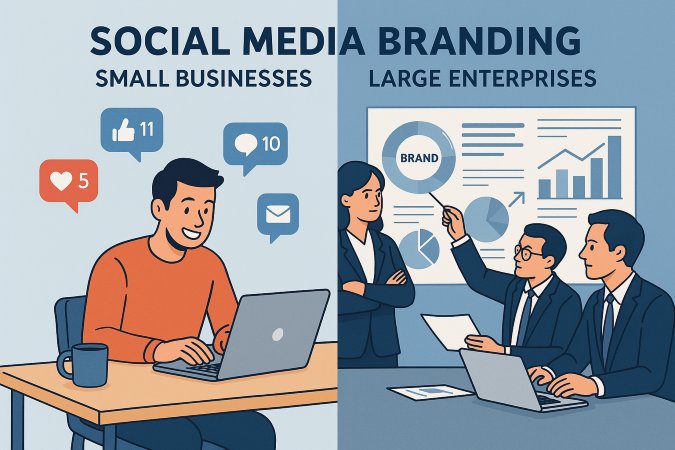The Importance of Social Media Branding for Businesses
|
Getting your Trinity Audio player ready...
|
In today’s digital landscape, social media branding has become a crucial component of a business’s success.
With billions of users actively engaging on platforms like Facebook, Instagram, LinkedIn, and Twitter, companies that establish a strong social media presence gain a competitive edge.
Social media branding goes beyond mere posting – it’s about building a unique identity, fostering trust, and creating long-lasting relationships with customers.
Table of Contents
ToggleWhat is Social Media Branding?

Social media branding is the process of creating a strong and consistent brand identity across platforms like Facebook, Instagram, LinkedIn, and TikTok. It involves using visuals, messaging, and tone to build trust and recognition.
With 4.95 billion social media users worldwide (Statista, 2024), platforms offer immense opportunities for businesses. A 2023 HubSpot study found that 90% of marketers see increased brand exposure through social media, and 78% report revenue growth.
Consistency is key – brands with uniform messaging see a 33% revenue boost (Lucidpress). Additionally, 76% of consumers are more likely to buy from brands they recognize on social media. By maintaining a cohesive identity, businesses enhance trust, recall, and competitive advantage.
Don’t Miss: What is Social Media Marketing and How Does It Help Businesses
Key Elements of Social Media Branding:
Consistent Visual Identity – Using the same logo, colors, fonts, and design elements across all platforms to create a recognizable brand image.
- Brand Voice & Messaging – Developing a unique tone (formal, friendly, or humorous) and crafting messages that align with the brand’s values.
- Quality Content Creation – Posting engaging, informative, and visually appealing content such as images, videos, blogs, and infographics.
- Customer Engagement – Actively interacting with the audience through comments, direct messages, and polls to build relationships.
- Strategic Use of Hashtags & Keywords – Enhancing visibility and discoverability by using relevant industry-specific hashtags and SEO-friendly keywords.
Why Social Media Branding is Essential for Businesses

In today’s digital world, social media branding is crucial for businesses to build recognition, trust, and engagement while driving growth.
In today’s digital world, social media branding is crucial for businesses to build recognition, trust, and engagement while driving growth. A strong social media presence helps companies establish credibility, improve visibility, and create meaningful connections with their audience.
1. Increases Brand Awareness
With 4.95 billion social media users worldwide (Statista, 2024), businesses have an unparalleled opportunity to expand their reach and visibility.
90% of marketers report that social media marketing has significantly boosted their brand awareness (HubSpot, 2023).
A consistent presence on platforms like Facebook, Instagram, LinkedIn, and TikTok helps businesses engage with potential customers, reinforce brand messaging, and stay top-of-mind in a competitive market.
Don’t Miss: How to Get More Followers and Engagement on Instagram
3. Build Trust and Credibility
A well-maintained and active social media presence enhances a brand’s credibility. 76% of consumers prefer purchasing from brands they recognize and trust (Lucidpress).
Posting high-quality content, responding to customer queries, and engaging with followers regularly build authenticity.
Brands that demonstrate transparency and showcase customer reviews, testimonials, and behind-the-scenes insights earn stronger consumer confidence and loyalty.
3. Enhances Customer Engagement
Social media provides direct interaction between brands and consumers. Engaging through comments, messages, live sessions, and polls fosters a loyal community.
Research shows that brands with strong social media engagement retain 89% of their customers, as people are more likely to stay connected with brands that actively interact with them. Businesses that prioritize engagement build long-term relationships and create brand advocates.
4. Improves Website Traffic and Conversions
Social media serves as a valuable traffic driver for business websites. 78% of marketers link their social media efforts to increased website visits and conversions (HubSpot, 2023).
Strategically placing links in posts, stories, and bios encourages potential customers to explore products and services.
A well-branded and visually appealing social media presence, combined with compelling calls-to-action (CTAs), boosts conversions and sales.
Don’t Miss: What is Social Commerce? Everything You Must Know?
5. Helps in Competitive Differentiation
With so many businesses vying for attention, having a unique and recognizable brand identity is essential. Consistent branding across social media platforms increases revenue by 33% (Lucidpress).
A brand’s distinct voice, engaging storytelling, and visually appealing content set it apart from competitors. Leveraging brand personality through creative posts, videos, and influencer collaborations helps businesses carve out a unique space in the industry.
6. Encourages Customer Loyalty
Building emotional connections with customers leads to long-term brand loyalty. Studies show that customers are 57% more likely to spend more on brands they feel emotionally connected to (Edelman Trust Barometer, 2023).
Social media branding allows businesses to humanize their presence by sharing employee stories, customer experiences, and behind-the-scenes content. This fosters deeper relationships and encourages repeat purchases.
7. Supports SEO and Online Visibility
Social media branding also plays a role in search engine optimization (SEO). Search engines like Google consider social signals such as shares, likes, and engagement when ranking websites.
According to Moz (2023), businesses with active social media profiles see higher organic search visibility. Regular posting, link sharing, and user engagement help brands improve their search rankings and online discoverability.
Best Practices for Effective Social Media Branding

Social media branding is essential for businesses looking to build a strong online presence and connect with their audience.
To create a successful brand identity, businesses must follow key best practices to ensure consistency, engagement, and credibility.
1. Maintain a Consistent Visual Identity
Your brand’s visuals should be uniform across all platforms. Use the same logo, color palette, fonts, and design elements to create a cohesive and recognizable brand presence.
2. Develop a Unique Brand Voice & Messaging
Define your brand’s tone – whether it’s professional, friendly, humorous, or authoritative. Ensure that all captions, responses, and content reflect your brand personality and core values.
3. Post High-Quality and Engaging Content
Create a mix of content, including images, videos, infographics, and blog posts, to keep your audience engaged. Share informative, entertaining, and promotional content in a balanced way.
4. Engage with Your Audience
Social media is a two-way communication channel. Respond to comments, messages, and mentions promptly. Encourage user-generated content, ask questions, and run interactive polls or contests.
5. Use Hashtags and Keywords Strategically
Research and use relevant industry-specific hashtags to increase reach and discoverability. Optimize post descriptions with keywords to improve search visibility.
6. Leverage Influencers and Collaborations
Partner with influencers or industry leaders to expand your brand’s reach. Collaborate with other businesses or content creators for cross-promotional campaigns.
7. Monitor Performance and Optimize
Track metrics like engagement, reach, and conversions using analytics tools. Test different content types and posting times to refine your strategy and improve results.
Don’t Miss: How to Create Viral Content for Social Media?
The Role of AI in Social Media Branding

Artificial Intelligence (AI) is transforming social media branding by making it more efficient, data-driven, and personalized. Businesses are leveraging AI-powered tools to enhance content creation, automate engagement, and optimize branding strategies.
1. AI-Powered Content Creation
AI tools like ChatGPT, Canva, and Lumen5 help businesses generate high-quality social media content, including captions, images, and videos. These tools analyze trends and suggest relevant content ideas, ensuring consistency in brand messaging.
2. Personalization & Audience Targeting
AI-driven algorithms analyze user behavior, preferences, and engagement patterns to deliver personalized content. Platforms like Facebook and Instagram use AI to show users tailored posts and ads, increasing brand visibility and customer engagement.
3. Chatbots for Customer Interaction
AI chatbots on platforms like Messenger and WhatsApp provide instant responses, improving customer service and engagement. These bots handle FAQs, recommend products, and enhance brand credibility through seamless communication.
4. Predictive Analytics & Trend Analysis
AI tools analyze vast amounts of social media data to predict trends and consumer preferences. Businesses can use AI-driven insights to refine their branding strategies and stay ahead of competitors.
5. AI-Generated Influencer Marketing Insights
AI identifies relevant influencers based on engagement rates and audience demographics, helping brands collaborate with the right personalities to enhance their brand image.
By integrating AI into social media branding, businesses can streamline processes, enhance personalization, and build a stronger digital presence, ultimately improving brand loyalty and customer relationships.
Don’t Miss: The Role of AI in Digital Marketing: Things You Need to Know
Social Media Branding for Small Businesses vs. Large Enterprises

Social media branding is essential for businesses of all sizes, but the approach varies significantly between small businesses and large enterprises.
While both aim for brand recognition, engagement, and customer loyalty, their strategies, resources, and challenges differ.
1. Budget and Resources
- Small Businesses: Typically operate with limited budgets and small marketing teams. They rely on organic reach, user-generated content, and cost-effective strategies like influencer collaborations and community engagement.
- Large Enterprises: Have dedicated marketing teams and bigger budgets, allowing them to invest in high-quality content creation, paid advertising, AI-driven analytics, and influencer partnerships on a larger scale.
2. Branding Flexibility
- Small Businesses: Can quickly adapt to trends, experiment with different branding styles, and directly engage with their audience for a more personalized approach.
- Large Enterprises: Must maintain a consistent global brand identity, making changes slower due to approvals, guidelines, and larger teams managing branding efforts.
3. Customer Engagement & Interaction
- Small Businesses: Prioritize building strong customer relationships through direct interactions, personalized responses, and community-driven content.
- Large Enterprises: Use AI chatbots, automated customer service, and large-scale engagement strategies to handle high-volume interactions while maintaining a brand voice.
4. Content Strategy
- Small Businesses: Focus on storytelling, behind-the-scenes content, and leveraging authenticity to connect with their niche audience.
- Large Enterprises: Invest in professional campaigns, high-production visuals, and multi-platform brand storytelling to maintain a broad audience reach.
While small businesses rely on agility and personal connections, large enterprises use structured, data-driven branding strategies. Both need a tailored social media approach to build a strong brand presence and drive long-term success.
How to Handle Social Media Crises and Reputation Management

In today’s digital world, social media can make or break a brand’s reputation. A single negative comment, bad review, or viral controversy can escalate into a full-blown crisis.
How a business responds to such situations determines its credibility and long-term success. Here’s how to effectively handle social media crises and manage brand reputation.
1. Identify the Crisis Early
Monitoring social media mentions, reviews, and comments using tools like Google Alerts or Brandwatch helps businesses detect potential crises before they escalate. Quick identification allows for a faster response and damage control.
2. Stay Calm and Assess the Situation
Panicking and responding impulsively can worsen the situation. Analyze the issue carefully—determine whether it’s a misunderstanding, customer complaint, or a viral controversy. Understanding the severity of the situation helps in crafting an appropriate response.
3. Respond Promptly and Professionally
Ignoring negative comments can damage a brand’s reputation. Acknowledge the issue quickly and respond with professionalism. Apologize if necessary, provide clear information, and assure your audience that steps are being taken to resolve the problem.
4. Take the Conversation Offline
For sensitive issues, offer to continue the discussion privately via direct messages, email, or customer service. This prevents further public escalation and allows for a more personalized resolution.
5. Learn and Improve
Once the crisis is resolved, analyze what went wrong and implement strategies to prevent similar issues in the future. Updating social media policies, training employees, and improving communication strategies help strengthen brand reputation.
Hire Fifth Shiels for Your Social Media Growth
Looking to elevate your brand’s online presence? Fifth Shield, the best social media marketing agency in Delhi, is your go-to partner for expert social media branding, engagement, and growth strategies.
Our team ensures consistent branding, audience engagement, and high-quality content creation across platforms like Facebook, Instagram, YouTube, LinkedIn, and more.
With data-driven strategies, we help businesses increased visibility, boost conversions, and build lasting customer relationships. Get 30-min FREE Marketing Consultation.
Wrapping Up
Social media branding is no longer optional – it’s a necessity for businesses aiming for sustainable growth in the digital era.
A well-executed social media branding strategy not only increases visibility but also builds trust, engagement, and customer loyalty.
By implementing best practices and staying consistent, businesses can leverage social media to create a powerful brand presence that drives long-term success.







Write a Comment